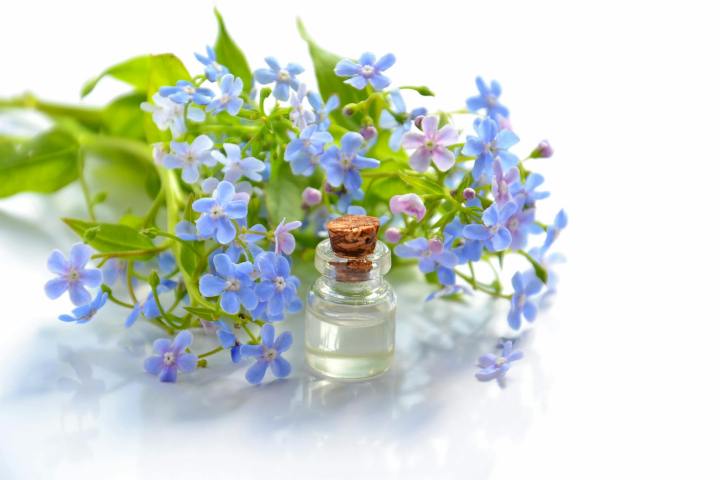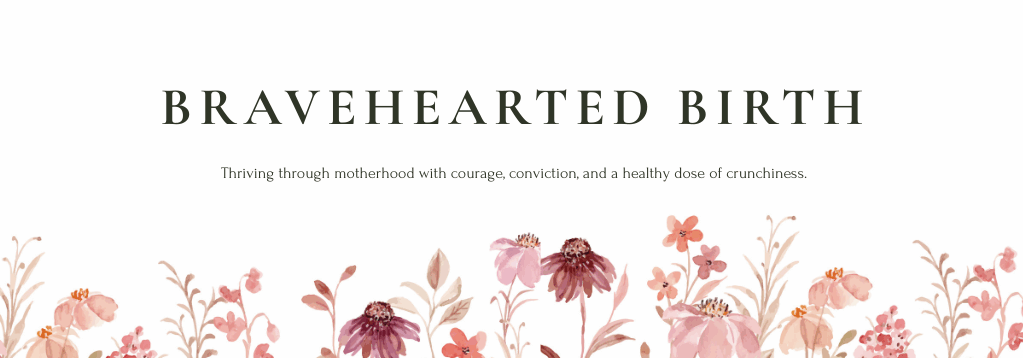Can I use essential oils for my baby? If so, how do I know which ones to use? What are the things I need to be cautious about? What are good oils to keep on hand for common childhood ailments? We’ll talk about all that and more in this two-part series.
I have so much to say about this that I had to split it up into two different posts. Today I’m going to talk about why I belive we need to be much more cautious about using essential oils for babies. You can refer to part 2 to read all about which essential oils are safe, and what to use them for.

I love essential oils.
I love my diffuser, and I love that I can smell great without spraying harmful chemicals onto my skin.
However, I don’t like to use essential oils on my baby. As a mom who loves natural and healthy products, I don’t often hear other moms who think like me talk about the very real risks of using essential oils. I think it’s an important conversation.
You may choose differently, and that’s totally fine. A lot of essential oils are considered safe for babies. And a lot of great moms use essential oils as an alternative to more dangerous fragrances, medications, or parabens. It’s totally up to you.
Disclaimer: I am not a doctor, and I am not giving medical advice. I am simply gathering information from experts and putting it all together for you so that you can make an informed decision. You’ll find links to my sources all through this article. 🙂
Using Common Sense
I do think it’s important to understand that essential oils really aren’t “natural” in every sense of the word. While they come from plants, they are highly concentrated. Bottled essential oils are often 50 to 100 times more concentrated than they are in nature. Essential oils come at much higher than “natural” concentrations.
For example, it takes 35 pounds of lavender blossoms to make one 15 mL bottle of lavender oil. That means that 20 drops contain the oil of a little over 2 pounds of flowers. You would never dump 2 pounds of herbal flowers into a baby-sized bathtub.
One drop of essential oil can contain the equivalent of 15-40 cups of tea, or 10 teaspoons of tincture. I would never feed my baby 40 cups of medicinal tea. But it seems so harmless to put 2-3 drops of lavender oil in the tub, right?

“Natural” does not equal “same as nature”
Just because something comes from a plant source doesn’t mean it’s healthy at high concentrations. Take morphine and heroin, for example. These are opiod drugs that are concentrated from the poppy plant. They are an addictive substances that can can cause dependence. At high dosages, they can cause overdose, brain damage, and death.
Please don’t hear what I’m not saying.
I am not saying that diffusing lavender oil in your kitchen equates to shooting up heroin in an alley. It doesn’t. Not at all.
My point is simply that “natural” essential oils are not the same concentration as what we find in nature. And plant substances, when highly concentrated, can be dangerous at times. So, yes, essential oils can be helpful. But we need to remember that they can come with side effects. We also need to remember that it’s very easy to overdose, especially when you’re using them on a tiny human.

Research-based cautions for using essential oils for babies
Essential oils should not be used on infants younger than 3 months. The American Association of Naturopathic Physicians recommends waiting to use essential oils until a baby is 3 months old, simply because newborn skin is so sensitive. Essential oils can irritate newborn rashes.
Do not let your baby swallow essential oils unless you are being supervised by a physician who is familiar with essential oils. I would not apply oil directly to my child’s gums for this reason, although some people feel comfortable doing so.
Certain oils, when given in high dosages, can slightly increase your child’s risk of seizures. Peppermint oil should not be used on a child younger than 30 months because it carries a risk of seizures for young children. Also, if your child has epilepsy, there are certain oils you should avoid here.
Seizures after essential oil exposure is super rare; but one 2021 study looked at a total of 15 children who needed medical attention after being exposed to eucalyptus oil. Most had ingested it, but a few cases oil was topically applied to the scalp (often natural lice treatments include eucalyptus oil) or put into the child’s bathwater.
Be considerate about diffusing essential oils around children who have asthma. I couldn’t find any studies that have specifically looked at how essential oil diffusers directly affect kids with asthma. However, doctors caution that diffused essential oils can emit volatile organic compounds, which are known to trigger asthma attacks. (Just for the record, any strong fragrance can really trigger an asthma attack, including air fresheners and candles.)
Interestingly, there’s a little bit of research that indicates that thyme, rosemary, and clove oil can help to reduce asthma symptoms in adults. But experts still recommend that you be careful about diffusing essential oils around kids with asthma.

Tips for Using Essential Oils Intelligently
Remember that oils and water don’t really mix well. So dropping a few drops of oil into the bathtub might bother your child if they have super sensitive skin. Most babies do just fine with essential oils in the tub, but it’s worth thinking about if your baby is breaking out after baths.
Whenever you can, use the version of the herb that is most like nature. This might look like brewing a cup of chamomile tea and mixing it into bathwater. Or buying dried lavender flowers to make a tea, then adding that to bathwater. This is a much more natural, normal concentration than using essential oils.
Don’t use them without needing them. Essential oils aren’t meant to be used recreationally. Be intentional about researching essential oils before you use them. If your child is sleeping fine, they really don’t need lavender oil baths. If your child is bathed regularly, they really don’t need essential oil scents to smell clean. And if your child isn’t fussy, then they probably don’t need aromatherapy for teething pain.
Be intelligent about dosing. If an adult dose is 1-2 drops, and your baby weighs 20 pounds, your child needs less than 1/2 drop to get the equivalent of an adult dose. You can find a dosage table here as a general reference for dosing essential oils by age if you are putting oil on your baby’s skin.
Buy your essential oils from a reliable source. Essential oils aren’t regulated. Some cheap essential oils are actually synthetic fragrances, which can have parabens in them, which are so harmful to you and your child.
Don’t apply undiluted essential oils to skin. Dilute a drop of oil in sunflower oil if you’d like to rub it on your baby’s skin. Avoid using olive oil as a carrier oil, since it actually can irriate sensitive skin.
Wrapping it Up
While we consider essential oils natural, that doesn’t mean that little bodies can safely handle high doses. We need to carefully think through our use of essential oils on babies. It can be done safely, but it should be done thoughtfully.
What other thoughts do you have about using essential oils for babies? Anything I missed, or should have added? I look forward to hearing from you in the comments.
Until next time,
Lynette
